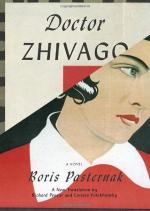|
This section contains 271 words (approx. 1 page at 400 words per page) |

|
In 1934, Pasternak declared that poetry was "pure prose in its pristine intensity," acknowledging the interrelation he sensed in the two genres. He considered Doctor Zhivago "the only worthwhile thing I have ever achieved," but commentators have noted passages in it where Pasternak seemed ill at ease with the novel form.
Nevertheless, his deliberately low-key style as well as his impressionistic shifts in time and place and his use of symbolic coincidence carry the Russian epic novel form into a new, altogether individual, mode of artistic expression.
Pasternak also chose a tripartite form for Doctor Zhivago often compared to a religious triptych and to a "literary sonata." The three panels of his novelistic altarpiece, like three movements of a monumental sonata, are Part I, Zhivago's early life, in which Pasternak announces his themes; Part II, Zhivago's love for Lara, Pasternak's exposition, followed by his codalike chapter 16, an epilogue which...
|
This section contains 271 words (approx. 1 page at 400 words per page) |

|




